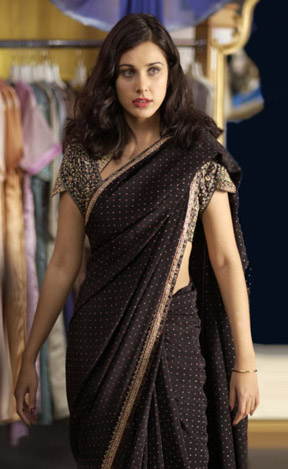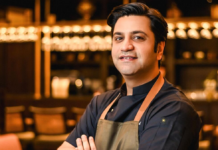
People hear the word cancer and they immediately think death sentence,” is how Lisa Ray describes the general perception of the illness, as she talks about her battle with cancer, defying gender norms and taking a stand for herself by shaving her head In Delhi recently to attend an event about women who have survived cancer, Lisa Ray talked about how she has been dealing with the illness after she was diagnosed with cancer in 2009, the rigidity of gender roles in India and how she uses her celebrity status to spread awareness and fight the misconceptions related to cancer.
“I never get tired of the cancer questions. For me, it’s very energizing. I have a philosophy of ‘pay it forward’, because so many people helped me when I was going through cancer. When I asked them what I could do in return, they told me to pay it forward. So, I use the platform that I have to talk about cancer and share my story.”
Talking about cancer is taboo in India. It has a huge fear factor wrapped around it. People hear the word cancer and they immediately think death sentence. It’s also the way that cancer is projected in the media, movies and popular culture. Getting accurate information out there is important. People also know that whatever the result may be, the treatment is not easy. You’re going to change physically, get very weak and lose your hair. So I think this adds to the fear.
Cancer, an opportunity
In India, people tend to be superstitious. Some of them think that being sick means they deserved it and it is part of their karma. They feel ashamed and hide it. I find this disturbing, because that is no way to heal. Cancer is an opportunity to live. It’s cliché to say that you have to deal with your mortality to get better, but it’s true. So I hope that people who’re diagnosed with cancer will be able to overcome these issues and that’s why we have to keep talking about it constantly. It’s very relevant in India because we’re dealing with almost epidemic levels of cancer and we don’t even have the resources to deal with it.
I was advised not to go public about my illness. My management felt that I shouldn’t go public about my condition because they were trying to protect my career. The common practice for someone in my business is to go underground. First, you recover and maybe then, you go public about it. You don’t go public while you’re starting your treatment, because that has repercussions. I was invited to the Toronto International Film Festival, when I was two months into my treatment and taking steroids.
I had gained about 18 kilos. I had to make a decision – to appear on the red carpet, lie about my appearance and hide my illness or go public. It was a challenge to announce my illness, because if I didn’t, they’d think I was in denial and if I did, it would be talked about a lot. I chose to hijack the moment and talk about something that forms a major part of me.
Support from everyone
I got a lot of support after I went public. People paid attention when I wrote my blog and I used the platform to announce my diagnosis. I got a lot of support. That is when I felt that I should use the attention I get to talk about something that’s really important to me and spread awareness about my particular kind of cancer. Another thing that galvanized me was the fact that Multiple Myeloma, which is what I have and something many people can’t even pronounce, needs to be brought to the public awareness because it’s incurable right now. But we can change its image into just a chronic illness, like diabetes, which anyone can live with.
I keep researching on what’s going on in the field of Multiple Myeloma. I get my blood tested once a month and I’m constantly on medication. It is a new ‘normal’ for me. I should have 25 different side effects, but I don’t. I think it’s partly mind over matter and partly because I take good care of myself. Cancer has changed my life and I actually owe a lot to it.
Gender typecasting in India
There is so much gender typecasting in India. You come across it every day. It makes you stop and think about gender roles. Is it really a function of biology or just conditioning? On a plane, people may or may not recognize me, but they’ll offer me a film magazine before a news magazine. But I want to read the damn news magazine. We’re judged by what we look like and what role we play in society. What else are you going to do except constantly try and find an antidote to that through your actions and the kind of life that you lead? I used to be very rebellious and defiant earlier, but I’m more relaxed now.
Separate identity
I’m a separate identity from my husband. My husband and I have some property in Canada. He’s becoming a non-resident, but I will continue to be a resident of Canada. So our property manager called me and said I needed to fill out forms because I’m becoming a non-resident too. I said, “When did I tell you that I’m becoming a non-resident?” He replied, “But your husband’s becoming one”. “So you assumed that because my husband is becoming a non-resident, I’ll automatically become one too?” I asked.
This was a white guy in Canada, not even in the US. The US is a lot more conservative. They assume when you’re married, you’re going to follow your husband’s lead. So this is not just in India, but everywhere.
Shaved my head
There is a sense of accomplishment in defying society’s rules and that is why I got rid of my hair twice before my chemotherapy started. It was my way of telling society that I would define myself, not you.
In the west, women can’t live a conventional life without criticism. I’m suspicious of mass movements.
All you can take responsibility for is yourself. Women have to value themselves in order to live the kind of life that they want. Some women want a more conventional life. And who are we to judge that? If you want to get married, have kids and lead that kind of a life, there should be no judgment on that. At the same time, if you’re leading that kind of life, don’t judge me.
My girlfriends in the west say things are confusing there now. It is seen as dismissive to lead a conventional life. There are women who want to settle down. That’s normal. But now, it has become difficult to actually do that. The pendulum has swung in the other direction. And that is why I’m suspicious of mass movements and broad, sweeping statements.
I think we should all take responsibility for our own lives. As women that’s the only thing we can do. It’s a matter of working on yourself as opposed to society. Society will follow you, don’t try to follow society. Don’t look to completely change society either because that’s taking too much on.
I avoid certain places in Delhi
Men look very differently at you in Delhi. So I choose to limit that exposure. I choose to not go to certain areas. It is sad, but like I said, “I have responsibility to myself and my choices”. I’d like to tell all Delhi girls to consider the possibilities you have and create the kind of life that you want. It is within your power. No matter what anyone tells you, remember that they’re just ideas. They’re not a reality.
Women are so powerful and naturally more resilient. Take some time to understand what you really want from life. I’m not talking about career choices, but the kind of life that you want to live. I’ve worked hard to create the life that I wanted and I don’t think that I’m more special than anybody else.
-Courtesy Times of India






